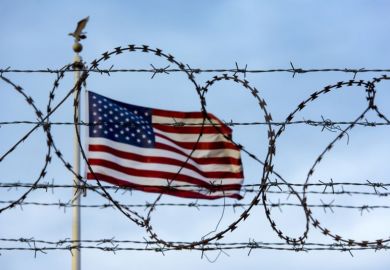Donald Trump’s top science adviser has promised limits to the administration’s escalating crackdown on foreign scholars, telling scientists the nation must remain vigilant but “cannot forsake” its openness.
Kelvin Droegemeier, director of the Office of Science and Technology Policy, addressed the annual policy conference of the American Association for the Advancement of Science amid reports of Chinese academics being evicted from US jobs in a White House-directed sweep, and US authorities blocking hundreds more Chinese scholars from coming.
Professor Droegemeier told AAAS members that he saw the need for both global scientific cooperation and firm vigilance against spying, and said he began his job as director determined to immediately help the White House properly balance those concerns.
Open US university research “is sort of under threat right now”, said Professor Droegemeier, a University of Oklahoma meteorologist. “But we can’t forsake that enterprise, that openness – it’s what made us who we are today, and it’s part of our value system.”
Professor Droegemeier nevertheless admitted to AAAS members that the administration’s delay in seating him until January – halfway through its four-year term – had prevented him from having “active involvement” in policy deliberations on the matter.
During that time, the Trump administration has been drawn deeper and deeper into political conflict with China on a variety of topics centring on economics and security. And for months, US university leaders and their associations have publicly endorsed the administration position that there are genuine national security risks on US campuses requiring governmental responses.
The University of Texas MD Anderson Cancer Center was reported last month to have expelled three Asian scientists, as part of a campaign in which the US National Institutes of Health wrote to MD Anderson and 54 other institutions raising security concerns with specific scientists.
It’s not clear how many other universities on the NIH list have taken similar actions, although few, if any, have publicly protested the effort.
Such silence from academic leaders, said the AAAS’ chief executive, Rush Holt, did not seem in keeping with the traditional scientific view “that open exchange is much better for our security than protectionism”.
“I actually find that troubling,” Dr Holt, a former Democratic member of Congress, told Times Higher Education.
Yet, he said, university leaders may just be keeping quiet long enough to figure out a coherent response to an emotional challenge full of legal, political and security complications. Along with the Trump administration moves, congressional Republicans have proposed legislation that would impose new requirements on the Department of Education and universities to monitor “sensitive” research work.
The Association of American Universities, which represents the nation’s premier research institutions, also appears uneasy about the administration’s hardening policy approach. In recent months, the AAU had talked of taking “very seriously” the US government’s warnings about the threat China poses to US universities.
But after an FBI official, Edward You, used the AAAS gathering to issue US scientists yet another warning about the dangers of cooperating with China, the AAU’s vice-president for policy, Tobin Smith, joined others in pushing back.
Mr Smith suggested to Mr You that government security specialists continued to misunderstand the fundamental nature of universities and their value. “They look at universities as if we’re industry…they talk about theft of intellectual property,” Mr Smith told the meeting. “Yes we have some intellectual property, but we’re about openness, we're about educating students.”
Register to continue
Why register?
- Registration is free and only takes a moment
- Once registered, you can read 3 articles a month
- Sign up for our newsletter
Subscribe
Or subscribe for unlimited access to:
- Unlimited access to news, views, insights & reviews
- Digital editions
- Digital access to THE’s university and college rankings analysis
Already registered or a current subscriber?








